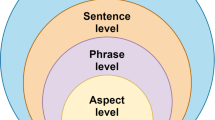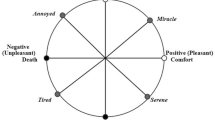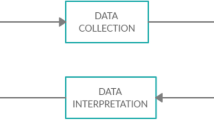Abstract
Sentiment analysis is a type of contextual text mining that determines how people feel about emotional issues that are frequently discussed on social media. The sentiments of emotive data are analyzed using a variety of sentiment analysis approaches, including lexicon-based, machine learning-based, and hybrid methods. Unsupervised approaches, particularly clustering methods are preferred over other methods since they can be applied directly to unlabeled datasets. Therefore, a clustering method based on an improved exponential cuckoo search has been proposed in this study for sentiment analysis. The proposed clustering method finds the optimal cluster centers from emotive datasets, which are then utilized to determine the sentiment polarity of emotive contents. The proposed improved exponential cuckoo search is first tested on standard and CEC-2013 benchmark functions before being utilized to determine the best cluster centroids from sentimental datasets. To assess the efficiency of the proposed method, it has been compared with K-means, cuckoo search, grey wolf optimizer, grey wolf optimizer with simulated annealing, hybrid step size-based cuckoo search, and spiral cuckoo search on nine sentimental datasets. The Experimental results and statistical analysis have proven the efficacy of the proposed method.











Similar content being viewed by others
Data Availability
Data used in this research are publicly available for research purpose.
References
Abed-Alguni BH, Paul DJ (2020) Hybridizing the cuckoo search algorithm with different mutation operators for numerical optimization problems. J Intell Syst 29(1):1043–1062
Agarwal P, Mehta S (2019) Subspace clustering of high dimensional data using differential evolution. In: Nature-inspired algorithms for big data frameworks. IGI Global, pp 47–74
Agrawal R, Kaur B, Sharma S (2020) Quantum based whale optimization algorithm for wrapper feature selection. Appl Soft Comput 89:106092
Ahuja S, Dubey G (2017) Clustering and sentiment analysis on twitter data. In: 2017 2nd International conference on telecommunication and networks (TEL-NET). IEEE, pp 1–5
Aljarah I, Mafarja M, Heidari AA, Faris H, Mirjalili S (2019) Clustering analysis using a novel locality-informed grey wolf-inspired clustering approach. Knowl Inf Syst xx:1–33
Amiri E, Mahmoudi S (2016) Efficient protocol for data clustering by fuzzy cuckoo optimization algorithm. Appl Soft Comput 41:15–21
Bartolo N, Komatsu E, Matarrese S, Riotto A (2004) Non-gaussianity from inflation: theory and observations. Phys Rep 402:103–266
Bezdek JC, Hathaway RJ (1994) Optimization of fuzzy clustering criteria using genetic algorithms. In: Proceeding of IEEE world congress on computational intelligence. USA, pp 589–594
Blake C (1998) Uci repository of machine learning databases. https://archive.ics.uci.edu/ml/datasets.php. Accessed 24 July 2021
Bondielli A, Marcelloni F (2019) A survey on fake news and rumour detection techniques. Inf Sci 497:38–55
Boonmee A, Sethanan K (2016) A glnpso for multi-level capacitated lot-sizing and scheduling problem in the poultry industry. Eur J Oper Res 250 (2):652–665
Brest J, Bošković B, Zamuda A, Fister I, Mezura-Montes E (2013) Real parameter single objective optimization using self-adaptive differential evolution algorithm with more strategies. In: 2013 IEEE congress on evolutionary computation. IEEE, pp 377–383
Canuto S, Gonçalves MA, Benevenuto F (2016) Exploiting new sentiment-based meta-level features for effective sentiment analysis. In: Proceeding of the ACM international conference on web search and data mining. USA, pp 53–62
ChandraPandey A, SinghRajpoot D, Saraswat M (2018) Data clustering based on data transformation and hybrid step size-based cuckoo search. In: 2018 11th international conference on contemporary computing (IC3). IEEE, pp 1–6
Chen T, Xu R, He Y, Wang X (2017) Improving sentiment analysis via sentence type classification using bilstm-crf and cnn. Expert Syst Appl 72:221–230
Chiong R, Fan Z, Hu Z, Adam MT, Lutz B, Neumann D (2018) A sentiment analysis-based machine learning approach for financial market prediction via news disclosures. In: Proceeding of the ACM genetic and evolutionary computation conference companion. Japan, pp 278–279
Chourasia S, Sharma H, Singh M, Bansal JC (2019) Global and local neighborhood based particle swarm optimization. In: Harmony search and nature inspired optimization algorithms. Springer, pp 449–460
Cobos C, Muñoz-Collazos H, Urbano-Muñoz R, Mendoza M, León E, Herrera-Viedma E (2014) Clustering of web search results based on the cuckoo search algorithm and balanced bayesian information criterion. Inf Sci 281:248–264
Collobert R, Weston J, Bottou L, Karlen M, Kavukcuoglu K, Kuksa P (2011) Natural language processing (almost) from scratch. J Mach Learn Res 12:2493–2537
Derrac J, García S, Molina D, Herrera F (2011) A practical tutorial on the use of nonparametric statistical tests as a methodology for comparing evolutionary and swarm intelligence algorithms. Swarm Evol Comput 1(1):3–18
Devi KN, Bhaskaran VM, Kumar GP (2015) Cuckoo optimized svm for stock market prediction. In: Proceeding of IEEE international conference on innovations in information, embedded and communication systems. India, pp 1–5
El Alaoui I, Gahi Y, Messoussi R, Chaabi Y, Todoskoff A, Kobi A (2018) A novel adaptable approach for sentiment analysis on big social data. Journal of Big Data 5(1):1–18
El Ansari O, Zahir J, Mousannif H (2018) Context-based sentiment analysis: a survey. In: International conference on model and data engineering. Springer, pp 91–97
Emary E, Zawbaa HM, Grosan C, Hassenian AE (2015) Feature subset selection approach by gray-wolf optimization. In: Afro-European conference for industrial advancement. Springer, pp 1–13
Emary E, Zawbaa HM, Hassanien AE (2016) Binary grey wolf optimization approaches for feature selection. Neurocomputing 172:371–381
Fernández-Gavilanes M, Álvarez-López T, Juncal-Martínez J, Costa-Montenegro E, González-Castaño FJ (2016) Unsupervised method for sentiment analysis in online texts. Expert Syst Appl 58:57–75
Friedman M (1937) The use of ranks to avoid the assumption of normality implicit in the analysis of variance. J Am Stat Assoc 32(200):675–701
Gong Y, Shin K, Poellabauer C (2018) Improving liwc using soft word matching. In: Proceedings of the 2018 ACM international conference on bioinformatics, computational biology, and health informatics, pp 523–523
Hemmatian F, Sohrabi MK (2017) A survey on classification techniques for opinion mining and sentiment analysis. Artif Intell Rev:1–51
Hu X, Tang J, Gao H, Liu H (2013) Unsupervised sentiment analysis with emotional signals. In: Proceeding of the ACM international conference on World Wide Web. Brazil, pp 607–618
Hu X, Tang L, Tang J, Liu H (2013) Exploiting social relations for sentiment analysis in microblogging. In: Proceeding of the ACM international conference on web search and data mining. USAr, pp 537–546
Hussain K, Mohd Salleh MN, Cheng S, Shi Y (2019) Metaheuristic research: a comprehensive survey. Artif Intell Rev 52(4):2191–2233
Janardana Naidu G, Seshashayee M (2021) Sentiment analysis for telugu text using cuckoo search algorithm. In: Smart computing techniques and applications. Springer, pp 253–257
Katarya R, Verma OP (2018) Recommender system with grey wolf optimizer and fcm. Neural Comput Applic 30:1679–1687
Kumar V, Chhabra JK, Kumar D (2017) Grey wolf algorithm-based clustering technique. J Intell Syst 26:153–168
Kumar A, Jaiswal A, Garg S, Verma S, Kumar S (2019) Sentiment analysis using cuckoo search for optimized feature selection on kaggle tweets. International Journal of Information Retrieval Research (IJIRR) 9:1–15
Li J, Li Y-X, Tian S-S, Xia J-L (2020) An improved cuckoo search algorithm with self-adaptive knowledge learning. Neural Comput Applic 32(16):11967–11997
Likas A, Vlassis N, Verbeek JJ (2003) The global k-means clustering algorithm. Pattern Recognit 36(2):451–461
Loria S (2018) Textblob documentation. Release 0.15 2:269
Ma B, Yuan H, Wu Y (2017) Exploring performance of clustering methods on document sentiment analysis. J Inf Sci 43(1):54–74
Mandal S, Singh GK, Pal A (2021) Single document text summarization technique using optimal combination of cuckoo search algorithm, sentence scoring and sentiment score. Int J Inf Technol:1–9
McHaney R, Tako A, Robinson S (2018) Using liwc to choose simulation approaches: a feasibility study. Decis Support Syst 111:1–12
Mirjalili S, Mirjalili SM, Lewis A (2014) Grey wolf optimizer. Adv Eng Softw 69:46–61
Mirjalili S, Lewis A (2016) The whale optimization algorithm. Adv Eng Softw 95:51–67
Mirjalili SZ, Mirjalili S, Saremi S, Faris H, Aljarah I (2018) Grasshopper optimization algorithm for multi-objective optimization problems. Appl Intell 48(4):805–820
Mohammed AS, Shukla V, Pandey AC (2020) Enhancing sentiment analysis using enhanced whale optimisation algorithm. Int J Intell Inf Database Syst 13(2-4):208–230
Monish H, Pandey AC (2020) A comparative assessment of data mining algorithms to predict fraudulent firms. In: 2020 10th international conference on cloud computing data science & engineering (confluence). IEEE, pp 117–122
Mukherjee A, Venkataraman V, Liu B, Glance NS (2013) What yelp fake review filter might be doing?. In: Proceeding of AAAI international conference on weblogs and social media. USA, pp 1–10
Nagamma P, Pruthvi H, Nisha K, Shwetha N (2015) An improved sentiment analysis of online movie reviews based on clustering for box-office prediction. In: 2015 international conference in computing communication & automation (ICCCA). IEEE, pp 933–937
Nasiri J, Khiyabani FM (2018) A whale optimization algorithm (woa) approach for clustering. Cogent Mathematics & Statistics:1483565
Nawaz MS, Nawaz MZ, Hasan O, Fournier-Viger P, Sun M (2021) An evolutionary/heuristic-based proof searching framework for interactive theorem prover. Appl Soft Comput 104:107200
Norris P (2012) Political mobilization and social networks the example of the arab spring. Electron Democr 10:55–76
Ott M, Choi Y, Cardie C, Hancock JT (2011) Finding deceptive opinion spam by any stretch of the imagination. In: Proceeding of ACM conference on computational linguistics: human language technologies. USA, pp 309–319
Pandey AC, Rajpoot DS (2020) Improving sentiment analysis using hybrid deep learning model. Recent Adv Comput Sci Commun (Formerly: Recent Patents on Computer Science) 13(4):627–640
Pandey AC, Rajpoot DS (2021) Feature selection method based on grey wolf optimization and simulated annealing. Recent Adv Comput Sci Commun (Formerly: Recent Patents on Computer Science) 14(2):635–646
Pandey AC, Tikkiwal VA (2021) Stance detection using improved whale optimization algorithm. Complex Intell Syst 7(3):1649–1672
Pandey AC, Rajpoot DS, Saraswat M (2016) Data clustering using hybrid improved cuckoo search method. In: 2016 9th international conference on contemporary computing (IC3). IEEE, pp 1–6
Pandey AC, Rajpoot DS, Saraswat M (2017) Hybrid step size based cuckoo search. In: Proceeding of 10th IEEE international conference on contemporary computing (IC3). IEEE, pp 1–6
Pandey AC, Rajpoot DS, Saraswat M (2017) Twitter sentiment analysis using hybrid cuckoo search method. Inf Process Manag 53(4):764–779
Pandey AC, Pal R, Kulhari A (2018) Unsupervised data classification using improved biogeography based optimization. Int J Syst Assur Eng Manag 9(4):821–829
Pandey AC, Garg M, Rajput S (2019) Enhancing text mining using deep learning models. In: 2019 12th International conference on contemporary computing (IC3). IEEE, pp 1–5
Pandey AC, Tripathi AK, Pal R, Mittal H, Saraswat M (2019) Spiral salp swarm optimization algorithm. In: 2019 4th International conference on information systems and computer networks (ISCON). IEEE, pp 722–727
Pandey AC, Rajpoot DS, Saraswat M (2020) Feature selection method based on hybrid data transformation and binary binomial cuckoo search. J Ambient Intell Humaniz Comput 11(2):719–738
Pandey AC, Kulhari A, Shukla DS (2021) Enhancing sentiment analysis using roulette wheel selection based cuckoo search clustering method. Journal of Ambient Intelligence and Humanized Computing:1–29
Phu VN, Vo T (2018) K-medoids algorithm used for english sentiment classification in a distributed system. Comput Model New Technol 22(1):20–39
Poria S, Cambria E, Gelbukh A (2016) Aspect extraction for opinion mining with a deep convolutional neural network. Knowl-Based Syst 108:42–49
Ray P, Chakrabarti A (2017) Twitter sentiment analysis for product review using lexicon method. In: Proceeding of IEEE international conference on data management, analytics and innovation. India, pp 211–216
Riaz S, Fatima M, Kamran M, Nisar MW (2017) Opinion mining on large scale data using sentiment analysis and k-means clustering. Clust Comput:1–16
Selim SZ, Alsultan K (1991) A simulated annealing algorithm for the clustering problem. Pattern Recognit 24:1003–1008
Shen H, Jin L, Zhu Y, Zhu Z (2010) Hybridization of particle swarm optimization with the k-means algorithm for clustering analysis. In: Proceeding of IEEE international conference on bio-inspired computing: theories and applications. USA, pp 531–535
Simon D (2008) Biogeography-based optimization. IEEE Trans Evol Comput 12:702–713
Sohangir S, Wang D, Pomeranets A, Khoshgoftaar TM (2018) Big data: deep learning for financial sentiment analysis. J Big Data 5:1–25
Strapparava C, valitutti A, Stock O (2006) The affective weight of lexicon. In: LREC, pp 423–426
Sun H, Morales A, Yan X (2013) Synthetic review spamming and defense. In: Proceeding of IEEE international conference on knowledge discovery and data mining. USA, pp 1088–1096
Taboada M, Brooke J, Tofiloski M, Voll K, Stede M (2011) Lexicon-based methods for sentiment analysis. Comput Linguist 37:267–307
Testdata.manual.2009.06.14 (2021) http://help.sentiment140.com/for-students/. Accessed July 2021
Tijare PV, Prathuri JR (2022) Correlation between k-means clustering and topic modeling methods on twitter datasets. In: Cyber security and digital forensics. Springer, pp 459–477
Tripathi AK, Sharma K, Bala M (2018) A novel clustering method using enhanced grey wolf optimizer and mapreduce. Big Data Res 14:93–100
Twitter dataset (2021) http://twitter.com/download/iphone. Accessed July 2021
Twitter-sanders-apple (2021) http://boston.lti.cs.cmu.edu/classes/95-865-K/HW/HW3/. Accessed July 2021
Vashishtha S, Susan S (2021) Highlighting keyphrases using senti-scoring and fuzzy entropy for unsupervised sentiment analysis. Expert Syst Appl 169:114323
Wang H, Lu Y, Zhai C (2010) Latent aspect rating analysis on review text data: a rating regression approach. In: Proceeding of ACM international conference on Knowledge discovery and data mining. USA, pp 783–792
Xia R, Xu F, Yu J, Qi Y, Cambria E (2016) Polarity shift detection, elimination and ensemble: a three-stage model for document-level sentiment analysis. Inf Process Manag 52:36–45
Xiong S, Ji D (2016) Exploiting flexible-constrained k-means clustering with word embedding for aspect-phrase grouping. Inf Sci 367:689–699
Xu D, Tian Y (2015) A comprehensive survey of clustering algorithms. Annals of Data Sci 2:165–193
Xue D, Wu L, Hong Z, Guo S, Gao L, Wu Z, Zhong X, Sun J (2018) Deep learning-based personality recognition from text posts of online social networks. Appl Intell:1–15
Yang X-S (2014) Cuckoo search and firefly algorithm: overview and analysis. In: Cuckoo search and firefly algorithm. Springer, pp 1–26
Yang X-S, Deb S (2009) Cuckoo search via lévy flights. In: Proceeding of IEEE world congress on nature & biologically inspired computing. India, pp 220–214
Yang XS (2010) A new metaheuristic bat-inspired algorithm. In: Proceeding of nature inspired cooperative strategies for optimization. Springer, UK
Yang XS, Deb S (2014) Cuckoo search: recent advances and applications. Neural Comput Applic 24:169–174
Yue L, Chen W, Li X, Zuo W, Yin M (2018) A survey of sentiment analysis in social media. Knowl Inf Syst 5:1–47
Yusof NN, Mohamed A, Abdul-Rahman S (2015) Reviewing classification approaches in sentiment analysis. In: Proceeding of international conference on soft computing in data science. Springer, Singapore, pp 43–53
Zainuddin N, Selamat A, Ibrahim R (2018) Hybrid sentiment classification on twitter aspect-based sentiment analysis. Appl Intell 48:1218–1232
Zainuddin N, Selamat A, Ibrahim R (2018) Hybrid sentiment classification on twitter aspect-based sentiment analysis. Appl Intell 48(5):1218–1232
Zaw MM, Mon EE (2013) Web document clustering using cuckoo search clustering algorithm based on levy flight. Int J Innov Appl Stud 4:182–188
Zhang Q, Couloigner I (2005) A new and efficient k-medoid algorithm for spatial clustering. In: International conference on computational science and its applications. Springer, pp 181–189
Zhang Q, Liu W, Meng X, Yang B, Vasilakos AV (2017) Vector coevolving particle swarm optimization algorithm. Inf Sci 394:273–298
Zhang L, Wang S, Liu B (2018) Deep learning for sentiment analysis: a survey. Wiley Interdiscip Rev: Data Min Knowl Disc 8:1–25
Zhu J, Wang H, Mao J (2010) Sentiment classification using genetic algorithm and conditional random fields. In: Proceeding of IEEE international conference on information management and engineering. China, pp 193–96
Funding
There has been no significant financial support for this work.
Author information
Authors and Affiliations
Contributions
All authors have participated in (a) conception and design, or analysis and interpretation of the data; (b) drafting the article or revising it critically for important intellectual content, and (c) approval of the final version.
Corresponding author
Ethics declarations
Ethics approval and consent to participate
Authors declare that this manuscript is original, has not been published before, and is not currently being considered for publication elsewhere.
Consent for Publication
We (authors) consent to publish the above research article in this Journal.
Conflict of Interests
Authors have no conflicts of interest associated with this publication
Additional information
Publisher’s note
Springer Nature remains neutral with regard to jurisdictional claims in published maps and institutional affiliations.
Ankur Kulhari, Himanshu Mittal, Ashish Kumar Tripathi and Raju Pal are contributed equally to this work.
Rights and permissions
Springer Nature or its licensor (e.g. a society or other partner) holds exclusive rights to this article under a publishing agreement with the author(s) or other rightsholder(s); author self-archiving of the accepted manuscript version of this article is solely governed by the terms of such publishing agreement and applicable law.
About this article
Cite this article
Pandey, A.C., Kulhari, A., Mittal, H. et al. Improved exponential cuckoo search method for sentiment analysis. Multimed Tools Appl 82, 23979–24029 (2023). https://doi.org/10.1007/s11042-022-14229-5
Received:
Revised:
Accepted:
Published:
Issue Date:
DOI: https://doi.org/10.1007/s11042-022-14229-5




